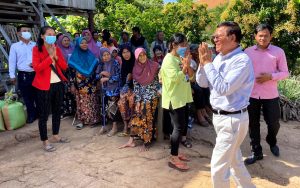Cambodia’s besieged political opposition is reeling after a latent disagreement between the country’s two most prominent opposition politicians broke out into apparent open acrimony over the weekend.
The first sign of a major rift took place on Sunday, when Kem Sokha, the former president of the banned Cambodia National Rescue Party (CNRP), posted a Khmer-language message on his Facebook page to announce he would no longer be associating with Sam Rainsy, his long-time partner and predecessor as leader of the CNRP.
In his post, Sokha accused Rainsy and his supporters of using Sokha’s name and image to promote their political activities, including the recent revival of Rainsy’s Candlelight Party, which held a congress on Saturday. It also claimed that Rainsy had “walked away from the original principles and spirit of unity” that undergirded the creation of the CNRP, which was established in 2012 via a merger of Sokha’s Human Rights Party and Rainsy’s eponymous party.
“Therefore, I call on Mr. Sam Rainsy and his groups to stop abusing me by using my name and photo in connection with their political ambitions, which confuse the national and international public,” Sokha wrote. “I would also like to affirm that I am not involved in and not responsible for the activities of Mr. Sam Rainsy and his group.”
In September 2017, Sokha was arrested on inflated charges of treason and has been under “court supervision” since his release from the maximum security CC3 prison in 2018, while his show trial has been repeatedly delayed since the COVID-19 pandemic. Rainsy, meanwhile, has been in exile since late 2015, when the Cambodian government activated a dormant arrest warrant while he was on a trip to South Korea.
In a Facebook message of his own, Rainsy claimed yesterday that Sokha’s message was not issued freely and was due to political pressure from the government led by long ruling Prime Minister Hun Sen, whose courts ordered the dissolution of the CNRP in November 2017. “This statement is the result of threats from Hun Sen who dreads unity among Cambodian democrats and who is holding Kem Sokha hostage,” Rainsy wrote on Facebook.
But this version of events was challenged by comments both by a Cambodian government eager to revel in the travails of its opponents, and from Sokha’s own camp. In remarkably forthright comments to Voice of Democracy, Kem Monovithya, Sokha’s daughter and the CNRP’s deputy director general of public affairs, described Rainsy as “a narcissistic, abusive, gaslighting, sociopathic partner.” She pointed to a pattern in which “statements were officially made by his lawyers and myself on his behalf while he was still in CC3 prison and again multiple times when he was out of prison” and described the divide between the two camps as “ugly” and “filled with disinformation and libels from the Sam Rainsy camp.”
The rift seems to mark an end – at least for now – to the political compact that created the CNRP, and the unity that was crucial to the party’s remarkable showing at the national election of July 2013, when it came close to toppling Hun Sen’s entrenched Cambodian People’s Party (CPP). Indeed, the CNRP’s percentage of the popular vote did not significantly exceed the total won by opposition parties at previous elections, but the fact that it was consolidated under a single major party brought Rainsy and Sokha close to prevailing over the CPP’s patronage machine.
At the same time, the party was always an awkward amalgam of two parties organized around personal loyalties to Sokha and Rainsy – loyalties that the CNRP was never really able to supersede – and forced to accommodate the political ambitions of the two leaders. Since the close-run 2013 election, Hun Sen’s strategy has been to apply intense pressure along the party’s fault lines in order to prompt exactly the sort of break that took place this weekend. In the country’s increasingly inhospitable political climate, it is less surprising that such a rift has emerged than that the Sokha-Rainsy pact managed to survive as long as it has.
With competitive elections seemingly a thing of the past – the 2018 election, held seven months after the CNRP’s dissolution was a one-horse race in which the CPP won all 125 seats in the National Assembly – the fracture is unlikely to have much immediate impact inside the country. But it nonetheless marks another sad milestone on the road toward the destruction of any meaningful source of Cambodian opposition, and makes it seem highly likely, if not entirely certain, that the 2023 national election will offer another predictable victory lap for Hun Sen and the CPP.

































